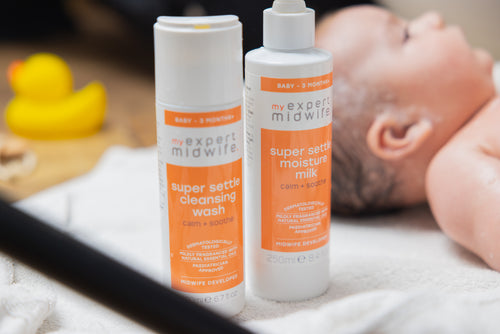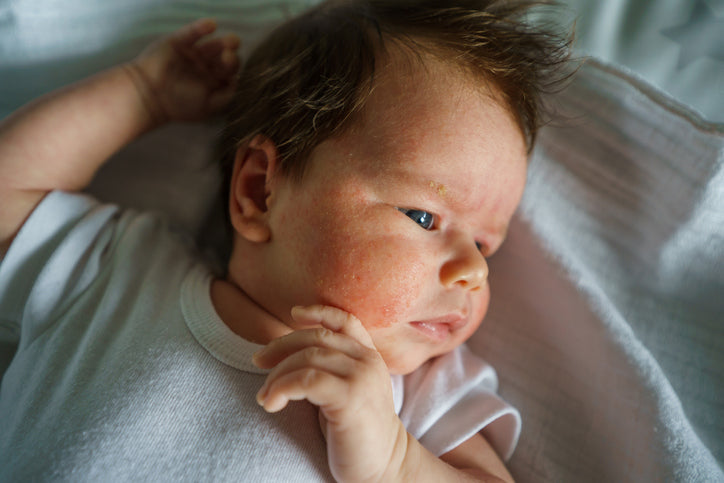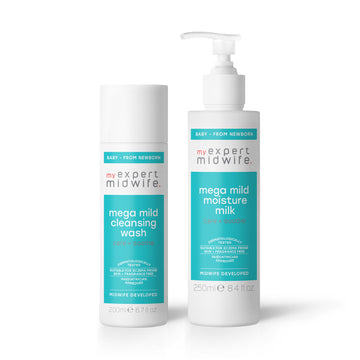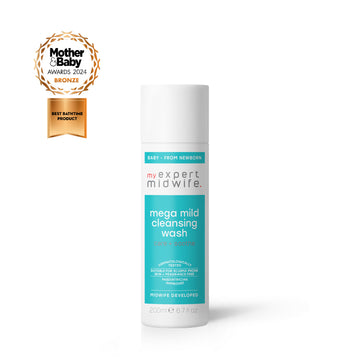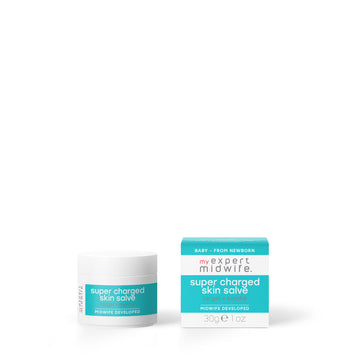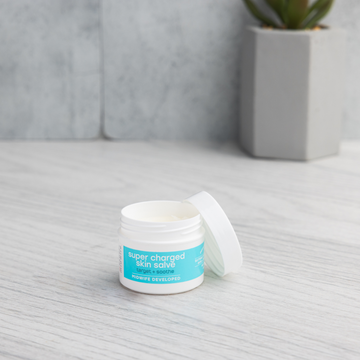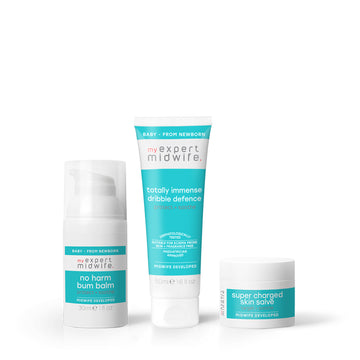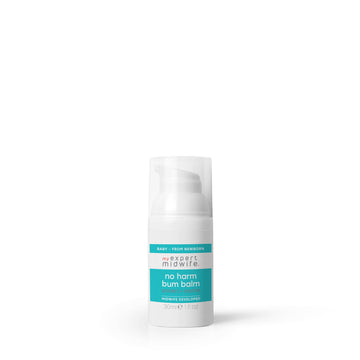What is eczema?
Eczema is a common, noncontagious inflammatory skin condition that causes patches of dry, scaly and itchy skin and is sometimes accompanied by blisters or infections of the skin, caused by excessive scratching.
There are several types of eczema, with atopic eczema being one of the most common. ‘Atopic’ means that it runs in families or affects those who already have other types of allergies such as asthma, hay fever or a food allergy.
Eczema affects people of all ages but most commonly affects babies and children - approximately 1 in 5 in the UK. Approximately one third of children with atopic eczema will also develop asthma and/or hay fever.
How to recognise eczema (signs and symptoms)
In babies, eczema can develop just after birth or, more commonly, between 3 and 6 months of age.
In these early stages, eczema usually affects the face, neck, body, arms and legs but, as the child grows older, it is often more visible in the flexural creases around the neck, knees, wrists, elbows and ankles. Occasionally, affecting the whole body.
In people with lighter skin, eczema usually appears as red and inflamed skin, whereas for people with darker skin it may feel ‘bumpy’ with small, raised papules and is often observed to look brown, purple, dark red, grey or ashen in colour.

The itch can be severe enough to interfere with sleep, causing tiredness and irritability.
Eczema’s presentation can vary from small flaky patches to big flare-ups that are open and sore.
The main symptoms of eczema are:
1. Dry skin
2. Rash
3. Intense itch
4. Inflammation
5. Redness
If the condition of your baby’s skin worsens and you become concerned, seek the advice of your GP or healthcare professional.
Causes of eczema on babies
- Family - If you or your family have a history of eczema, then your baby may be more prone to it.
- Allergies or sensitivities - to food, laundry detergent, fabric, or other skin irritants are the most likely cause of eczema in newborn babies.
- Fragile skin - People with eczema tend to have a weak skin barrier that allows moisture to escape and irritants to enter, leading to dryness and inflammation.
- Immune system - Eczema is an immune-driven condition that has been associated to overreactions on the part of the immune system.
- Foods? - It is a common misunderstanding that food allergy causes eczema, this is not true. However, having a food allergy may cause a sudden eczema flare or worsen the condition over time.

Where eczema develops in the first few months of life there is an increased likelihood of developing a food allergy.
If you feel your baby’s milk or a food is causing their eczema to worsen, please seek medical advice.
What makes atopic eczema flare-up in babies?
- Environmental irritants such as soaps, detergents and other chemicals, heat, dust, woollen clothing, and pets
- Allowing the skin to dry out
- Teething
- Being unwell, for example having a common cold
- Bacterial or viral skin infections where the skin may look yellow, crusty, and inflamed or have weeping sores
- Rarely, food allergens
- Stress
Diagnosing eczema
Blood tests and skin tests are usually not necessary, as GPs, Health Visitors and Practice Nurses can usually identify eczema with a simple physical examination of the skin.

Your health care provider may ask about when the symptoms started, how long they have been present, what tends to cause flare-ups and how the condition is affecting your child’s everyday life.
Here is how to care for eczema in three simple steps.
1. Wash
- Bathe at night before bedtime, when the skin is more likely to lock in moisture while keeping irritants out.
- Use lukewarm water rather than warm, as heat is a common trigger for eczema and having the bath water too hot may trigger the itch-scratch cycle.
- Bath your baby for no longer than 5-10 minutes.
- Water alone is very drying on the skin, so use a gentle cleanser which is recommended for sensitive skin and which contains no nasties - our Mega Mild Cleansing Wash and Super Settle Cleansing Wash are ideal.
- Avoid rubbing or scrubbing the affected skin to prevent further damage.
2. Treat
- After bathing, pat the skin lightly with a fresh towel, leaving it slightly damp. Water softens the skin and enables it to better absorb any moisturisers, prescription creams or ointments.
- The severity of the eczema will determine the treatment plan:
- A natural and gentle moisturiser such as Mega Mild Moisture Milk is ideal for moisturising your baby’s skin several times a day. Clinical studies have shown that Mega Mild Moisture Milk increases skin moisture by 49% and reduces the effect of trans epidermal water loss (TEWL) by 14%.
- Many parents swear by the soothing and calming effects of Super Charged Skin Salve, which was expertly developed to target dry and inflamed skin.
- Topical steroid creams or ointments may be needed to improve the redness and itching of active atopic eczema. Your doctor or specialist nurse will advise which cream or ointment is best suited to your baby, where to apply it and for how long.
- In severe cases, intensive treatment may be required. This can include ‘wet wraps’ or stronger medicines– most commonly medicines to calm down the immune system. Only specialist doctors will prescribe these.
- If eczema becomes wet, weepy and crusted, it may be infected, and a course of antibiotics may be necessary.
3. Moisturise

- Always, always moisturise your baby after a bath, wash or swimming.
- Apply the moisturiser to damp skin to increase absorption.
- Generously apply a moisturiser all over the body (not just the eczema areas) to lock in moisture.
- Use a moisturiser with a pump or dispense the product using a clean spoon to avoid contamination.
- Apply it with your palms, stroking lightly in a downward direction. And if you and your baby fancy it, here’s how to give them a lovely baby massage.
- Wait a few minutes to let the moisturiser absorb into the skin before dressing your baby.
- Do not limit moisturising to bath time. Slather it on throughout the day – at least 2-3 times/day – and whenever the skin starts to itch or feel dry.
Top tips for treating and preventing eczema

It is important to treat eczema early, as the more severe it becomes, the more difficult it is to manage.
- The most important part of your baby’s skin care is to moisturise them as often as possible, at least 2-3 times per day if your baby has eczema or dry skin. Use a soothing, unperfumed moisturiser, such as Mega Mild Moisture Milk for all-over-the body and Super Charged Skin Salve to help calm and relieve areas of soreness and inflammation.
- Wash your baby with a gentle product intended for dry and sensitive skin. Our Mega Mild Cleansing Wash is suitable for newborn skin and Super Settle Cleansing Wash can be used on babies over 3 months old - both are suitable for eczema prone skin.
- Wash all clothes with a non-biological and, ideally, natural washing powder and use a double rinse cycle to remove detergent residues from the clothing.
- Wash all new clothes at least once before putting them on your baby.
- Dress them in comfortable clothes made of natural materials such as cotton, bamboo and silk and avoid dressing them in synthetic fibres like polyester. Due to the ‘itchiness’ of some wool, it is also probably best avoided.
- Avoid products that contain synthetic fragrances – this includes softeners, perfumes, gels and moisturisers.
- Keep your baby cool. Overheating can make eczema itch more.
- Rinse well after swimming and apply plenty of moisturiser after drying.
- Do not keep pets if there is an obvious allergy.
- Avoid close skin contact with anyone who has an active cold sore as babies with eczema are at an increased risk of getting a widespread cold sore infection.
Key takeaway
Most children affected by atopic eczema will see improvement as they get older, with 60% being clear of it by their teens. Many, however, may continue to have dry skin and will therefore benefit from lifelong avoidance of irritants such as soaps, detergents, and bubble baths.
The best way to keep eczema under control is to establish a daily skincare regime and stick with it.
Although there is no known cure for eczema (for now), experts strongly recommend managing symptoms by:
- Avoiding trigger factors (things that make eczema worse)
and
- Having a clear treatment plan for managing eczema
